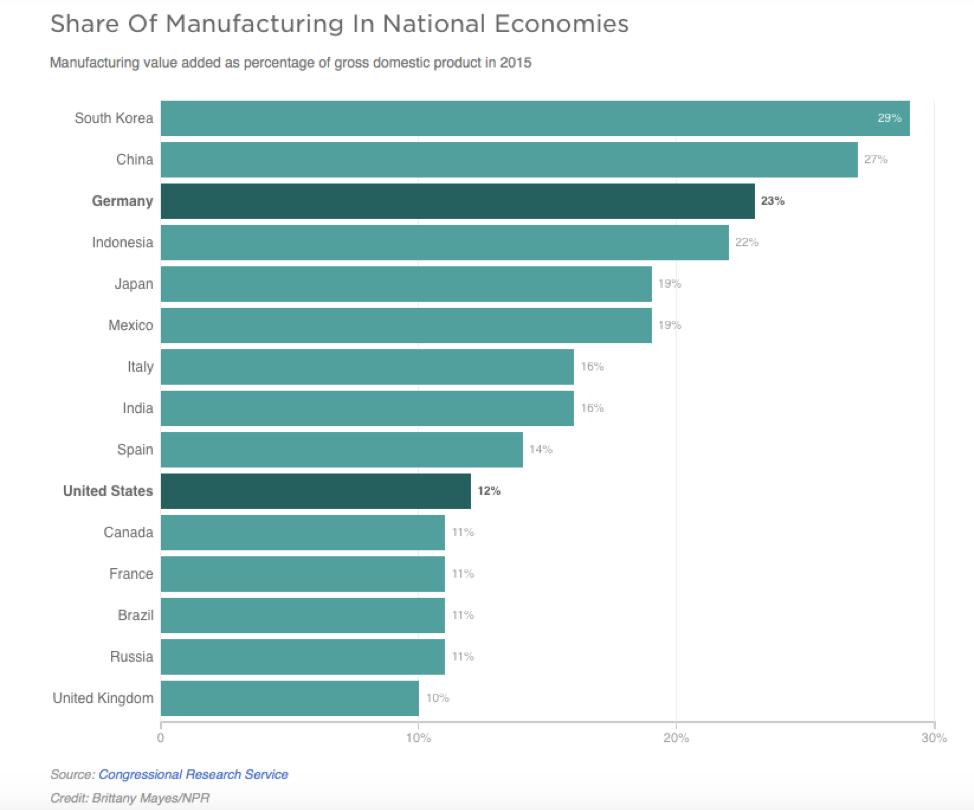There are plenty of things to worry about in Europe right now, far beyond the populist far-right Italian government going on a spending spree that threatens the rest of the European Union. Nor is it just the never-ending Brexit drama that has introduced a chafing uncertainty. the slowdown in Germany is potentially more damaging that all of this put together.
The question is, how strong is the Germany economy, really? It is, after all, the fourth-largest economy in the world--but it is also heavily reliant on exports that are taking a big hit from forces beyond its control.
The last quarter of 2018 was frightening because Germany’s economy stalled, prompting talk of recession. The months preceding that had most thinking that Germany would ride out the trade war without too much turbulence—but it’s catching up now.
For the first quarter of this year, it looks like the German economy will get away with only moderate growth, but the country’s Economy Ministry on Thursday warned that the industrial sector will remain weak. That’s because of sluggish demand from abroad—thanks to the unresolved trade dispute and the unresolved Brexit.
Germany has always been a manufacturing beast, with manufacturing making up some 25 percent of the economy (double its percentage in the U.S., for instance).
In terms of manufacturing value added as a percentage of GDP in 2015, by way of example, this is what the global picture looked like, according to NPR:

(Click to enlarge)
The Financial Times is citing a German research institute as cutting expectations for German growth this year by almost 50 percent. That has prompted Axios to call Germany “Europe’s most dangerous company”.
The dismal Q4 2018 showing sounded off alarm bells, and while the first quarter is not expected to be another zero-growth story, the fact that the Economy Ministry is expecting only moderate growth isn’t making anyone feel much better.
The slowdown, it would seem, may not have been just a temporary glitch from last year.
For Germany, it’s all about exports.
And now they have to deal with the self-imposed ban on arms exports to Saudi Arabia, as well as the potential of auto tariffs coming out of the U.S. Related: Silver Demand Set To Grow Significantly In 2019
In February, official data showed manufacturing contraction. As Reuters reported then, Germany had seen a slump in exports that led to two consecutive months of manufacturing contraction.
The index to watch is Markit’s Purchasing Managers Index (PMI) for manufacturing. The index accounts for approximately one-fifth of the economy and it dropped to 49.7 in January—below 50 marks the change from growth to contraction. In February, it dropped further to 47.6.
Then, this month, the Munich-based Ifo Institute cut its 2019 growth forecast for Germany from 1.1 percent to 0.6 percent.
Any further decline and recession is a real possibility.
It’s all the more poignant because it comes as a bit of a surprise, despite the fourth quarter’s poor showing.
In February, contracts for good made in Germany showed a 2.6-percent decline month-on-month, according to Reuters, which noted that this market the steepest decline since June 2018. But it also contradicted forecasts that had actually called for an increase.
Trump isn’t helping.
Related: 40% Of Canadians Pay Zero Income Tax
Even this week, Trump threatened the EU with more tariffs if Brussels fails to negotiate a favorable trade deal with the U.S. “They are willing to talk to us and if they don’t talk to us, we’re going to do something that’s going to be pretty severe economically. We’re going to tariff a lot of their products”, Trump said. Trump makes lots of threats that are carried out in his game of leverage, but it still must make Germany nervous given its raw industrial data.
This would be economic hostility that would cross a war line.
When the world’s fourth-largest economy is flirting with recession and data makes it clear that it’s not a glitch, the global economy should be more than a little worried. It will make over-spending Italy seem like a mild wound. It’s not a German problem or even a European problem—it’s a global problem.
By Tom Kool for Safehaven.com
















